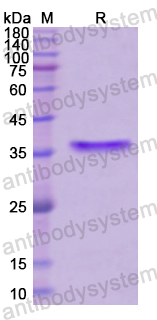Catalog No.
YHB90802
Expression system
E. coli
Species
Homo sapiens (Human)
Protein length
Glu351-Ser437
Predicted molecular weight
37 kDa
Nature
Recombinant
Endotoxin level
Please contact with the lab for this information.
Purity
>90% as determined by SDS-PAGE.
Accession
P01106
Applications
ELISA, Immunogen, SDS-PAGE, WB, Bioactivity testing in progress
Form
Lyophilized
Storage buffer
Lyophilized from a solution in PBS pH 7.4, 0.02% NLS, 1mM EDTA, 4% Trehalose, 1% Mannitol.
Reconstitution
Reconstitute in sterile water for a stock solution. A copy of datasheet will be provided with the products, please refer to it for details.
Shipping
In general, proteins are provided as lyophilized powder/frozen liquid. They are shipped out with dry ice/blue ice unless customers require otherwise.
Stability and Storage
Use a manual defrost freezer and avoid repeated freeze thaw cycles. Store at 2 to 8°C for frequent use. Store at -20 to -80°C for twelve months from the date of receipt.
Alternative Names
Proto-oncogene c-Myc, BHLHE39, MYC, Myc proto-oncogene protein, bHLHe39, Transcription factor p64, Class E basic helix-loop-helix protein 39
STK32C promotes colon tumor progression through activating c-MYC signaling., PMID:40515843
Qualitative Proteomic Profiling of Saccharomyces cerevisiae E1 Strain During Alcoholic Fermentation of Yellow Passion Fruit: A First Approximation., PMID:40509384
Targeting the Undruggable: Recent Progress in PROTAC-Induced Transcription Factor Degradation., PMID:40507351
Polyphyllin I inhibits ovarian cancer growth by inducing G0/G1 phase arrest and inhibiting the c-Myc signaling pathway., PMID:40506557
Identification of genes associated with liver ischemia-reperfusion injury after liver transplantation by WGCNA and PPI network analyses., PMID:40505700
Computational exploration of Arabidopsis thaliana N-Myc downregulated-like-1 for protein-protein interaction and phylogenetic conservation., PMID:40501096
ONECUT2 reprograms neuroendocrine fate and is an actionable therapeutic target in small cell lung cancer., PMID:40500731
Molecular patterns and mechanisms of tumorigenesis in HPV-associated and HPV-independent sinonasal squamous cell carcinoma., PMID:40500270
Insights into retinoblastoma pathogenesis: unraveling RB1, N-MYC and miRNA profiles., PMID:40499938
Simple Transgene Overexpression using Scallop Hemocyte Culture Platform Enables Functional Genetic Research in Molluscs., PMID:40498244
The Regulatory Network of Transcription Factors in Macrophage Polarization., PMID:40496968
Clinical significance of cyclin-dependent kinase inhibitor 3 in hepatocellular carcinoma., PMID:40496041
Harnessing traditional medicine and biomarker-driven approaches to counteract Trichostatin A-induced esophageal cancer progression., PMID:40495945
Differential susceptibility and role for senescence in CART cells based on costimulatory domains., PMID:40495168
Small extracellular vesicles from HO-1 modified BMMSCs alleviate steatotic liver grafts ischemia-reperfusion injury by delivering PDIA4 to promote reparative macrophage polarization., PMID:40494182
Disruption of KLHL37-N-Myc complex restores N-Myc degradation and arrests neuroblastoma growth in mouse models., PMID:40493396
Identification of autophagy-related genes in intestinal ischemia-reperfusion injury and their role in immune infiltration., PMID:40491449
Synthetic CRISPR Networks Driven by Transcription Factors via Structure-Switching DNA Translators., PMID:40491004
MYC: The Guardian of Its Own Chaos., PMID:40488968
Clinicopathological Characteristics of Upper Tract Urothelial Cancer With Loss of Immunohistochemical Expression of Mismatch Repair Proteins., PMID:40488817
Wnt Signaling in Male Genital Lichen Sclerosus, Differentiated Penile Intraepithelial Neoplasia, and Penile Squamous Cell Carcinoma., PMID:40486660
Nanobody-based fluorescent immunoassay for SARS-CoV-2 spike detection via site-specific microbial transglutaminase labeling., PMID:40483875
In-silico identification and experimental validation of shared genes and pathways to decipher the molecular links between COPD and MASLD., PMID:40482557
The slow elimination of 1,4-bis [2-(3,5-dichloropyridyloxy)] benzene in mice leads to prolonged constitutive androstane receptor activation and hepatomegaly., PMID:40482433
SMARCB1 orchestrates cellular plasticity and oncogenic pathways in typical and chondroid chordomas., PMID:40481032
Stemness reducible effects of glyasperin A against NCCIT teratocarcinomas., PMID:40478339
Natural Product Daidzin Inhibits Glioma Development via Suppressing the LRP5-Mediated GSK-3β/c-Myc Signaling Pathway., PMID:40476323
Immunomodulatory effects of alpha vs beta radiopharmaceutical therapy in murine prostate cancer., PMID:40475779
Integrative in silico analysis of per- and polyfluorinated alkyl substances (PFAS)-associated molecular alterations in human cancers: a multi-cancer framework for predicting toxicogenomic disruption., PMID:40474796
Evaluation of c-Myc and Phosphorylated Glucocorticoid Receptor (p-GR) for Predicting Diabetic Foot Ulcer Healing-A Diabetic Foot Consortium Study., PMID:40470688
Targeting the MDK/c-Myc complex to overcome temozolomide resistance in glioma., PMID:40468625
A Naturally Derived Glycosylated Oleanolic Acid Derivative Suppresses NF-κB Translocation and Induces Intrinsic Apoptosis in Lung Adenocarcinoma Cells., PMID:40468424
A role for pH dynamics regulating transcription factor DNA-binding selectivity., PMID:40464693
Mechanism of SLC1A5 Regulation of Glutamine Metabolism to Promote Ferroptosis Sensitivity in Endometriosis., PMID:40464516
N-Myc downstream regulated gene 1b is a regulator of cell adhesion during early muscle development., PMID:40462946
Inhibition of tumor-intrinsic NAT10 enhances antitumor immunity by triggering type I interferon response via MYC/CDK2/DNMT1 pathway., PMID:40461504
Selective targeting of genome amplifications and repeat elements by CRISPR-Cas9 nickases to promote cancer cell death., PMID:40456709
The cell-permeable iron chelator M606 inhibits MYCN-driven neuroblastoma via an E2F3-mediated response., PMID:40455982
In vivo DMBA induced mouse skin epithelial hypertrophy and associated molecular changes during various intervals within 24-hour of exposure and their prevention by natural agents., PMID:40454912
MYCBP2 Expression Correlates With Poor Prognosis in Upper Tract Urothelial Carcinoma Patients., PMID:40454884
The Impacts of TNF-α-Induced Inflammation on Amnion Epithelial Cells: Exploring Stem Cell Gene Expression, Senescence, Inflammatory Responses, and Cellular Transition., PMID:40454815
Deciphering a novel polysaccharide from Keemun black tea: structural elucidation and anti-colorectal cancer exploration., PMID:40454628
Harnessing miRNA dynamics in HIV-1-infected macrophages: Unveiling new targeted therapeutics using systems biology., PMID:40453371
The antitumor effects and apoptotic mechanism of 20(S)-Protopanaxadiol in acute myeloid leukemia., PMID:40453346
A feedforward loop between ACLY and MYC supports T-ALL progression in vivo., PMID:40453140
c-Myc-dependent LAMP3 regulates the proliferation, metastasis and metabolic reprogramming of tongue squamous cell carcinoma., PMID:40450055
Differential MYC Phosphorylation Drives the Divergent Cholangiocyte Response to Stress., PMID:40449843
ZuoJin Pill intervention in HCT116 tumor-bearing mice: Modulation of tumor growth, intestinal barrier integrity and microbial composition., PMID:40449449
Transcriptome analysis of medaka spermatogonial stem cell line (SG3) infected with ranaviruses in vitro., PMID:40447205
Dual synthesis pathways of scaRNA28 via intronic processing of transformation/transcription domain-associated protein transcripts and a novel independent transcription unit., PMID:40444427


